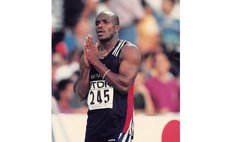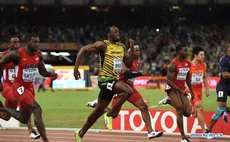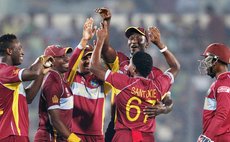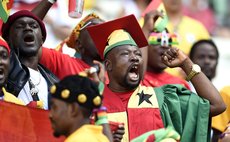A forgotten hero
Guyana celebrates fifty years of independence and expectedly the country takes stock of its varied achievements on a variety of fields. Inevitably, sports have come under the national focus, with cricket receiving a sizeable share of the spotlight. The lineup of Guyanese cricketers accorded status of super heroes is highly impressive: Clive Lloyd, Rohan Kanhai, Shivnarine Chanderpaul, Lance Gibbs, Roy Fredericks, Alvin Kallicharran, Colin Croft are among those touted as larger than life. However, from what I am hearing, there is likely to be a gentleman whose value to West Indies cricket might be overlooked. The name is Basil Fitzherbert Butcher; a batsman of rare character – a virtue seemingly lost or apparently displaced as archaic.
My appraisal of the real stature of Basil Butcher goes back to the year 1960 while he was yet 26 years of age. It was an extremely trying time for him as he endeavoured to fill the role of being brought into the middle order of the West Indies team to provide replacement for, of all people, Everton Weekes and Clyde Walcott. In case you don't realize it, Weekes is the man who still holds the record of scoring five consecutive centuries in consecutive Test innings. And Walcott, an equal colossus, racked up five centuries in a single Test series – and against none other than Australia, the strongest at the time. Please believe also Walcott's feat twice included centuries in each innings of a Test. These are records giving men nightmares merely to think about them. That was the kind of pedigree assumed for anyone coming into the side with bat in hand.
Butcher was not actually making his debut. This he had done somewhat promisingly against India with 28 and 64 not out at Bombay; 2 and 60 at Kanpur; 103 at Calcutta, 142 and 16, and 71 at Delhi in 1958-59 on tour to the Sub-Continent. He followed it up scoring 45 and 61 at Karachi, 11 and 8 at Dacca and 6 (run out) at Lahore. His venture into the Sub-Continent saw him third in the averages against India with 69.42 per completed innings, and second against Pakistan with 33.32.
But, now came the big test nine months later against England. India and Pakistan were at the time considered small fry. What happens? If I had not seen with my own eyes, I could never have believed. Coming in at No.6, and with the board reading 501 for 4, of which Sobers had smashed 226 rather imperiously and Worrell, elder statesman that he was, was in process of compiling an undefeated 197 – and all that coming after England had amassed 482 on the benign Kensington Oval strip at Barbados, the 26 year old Guyanese utterly failed the test of scrutiny only Bajans could give. I felt sorry for the guy. He made 13 runs, none of them off the middle of his bat, almost caught twenty times! And when finally he succumbed caught Trueman bowled Dexter it was a sympathetic end to a painful agony!
Butcher was retained for the second Test at Port-of-Spain, Trinidad and he must have wished he had not been retained as he fell for naught and nine – LBW to Brian Statham both times. There was no Butcher for the rest of the five-match series.
Then, even more ominously he was not on the selection list to go to Australia for the famous tour with Worrell as captain. After all, Worrell had been the non striker to see him squirm in that painful 13 at Barbados.
It was quite a period of mourning for Basil Butcher as he was bypassed for India's visit to the Caribbean in 1961-62 – and Worrell won that series 5-nil. It was perhaps a stroke of luck that the Guyanese was chosen to go to England with Worrell in 1963, and that's where our hero was to reveal his magnificent temperament – under conditions calling for true grit and determination. A lesser man might easily have called it quits and stopped playing cricket altogether after the Bridgetown debacle. Not so for Basil. The first Test at Old Trafford, Manchester owed much to a monumental 182 by Conrad Hunte supported by Rohan Kanhai 90 (run out), Sobers 64, Worrell 74 and Joe Solomon 35 to post 501 for 6 declared. England succumbed with 205 and 296 to lose by 10 wickets. Butcher's contribution was a paltry 22.
Things tightened for the 2nd Test at Lords. Fred Trueman's 6 for 100 and Derek Shackleton 3 for 93 squeezed West Indies out for 301 and England came close in reply with 297. That's where Worrell shuffled the batting order to promote Butcher to No. 4. And what a good thing it proved to be. West Indies lost wickets at 15, 15, 64, 84 and 104 for 5. Not among them was Butcher who repaid his captain's faith in him with 133 before he fell LBW to Shackelton. West Indies 229 followed by England 228 for 9 in an enthralling draw in which Colin Cowdrey returned at the close with a broken arm and six runs short of what would have been a magnificent victory. The series rounded off with Butcher getting 15 and 14 in the 3rd Test at Birmingham won by England by 217 runs amid total failure by West Indies dismissed for 186 and 91. Our hero contributed 23 and 78 to West Indies' triumph by 221 runs in the 4th Test at Headingley, Leeds, and 53 (run out) and 31 not out to seal the 5th Test at the Oval with an eight wicket win for West Indies who took the series 3-1.
For the 1964-65 Australia tour to the Caribbean, Butcher consolidated with 39 and 71 at Kingston, Jamaica, 117 (run out again) and 47 at Port-of-Spain, Trinidad; 49 (run out!) and 18 at Bourda, Guyana; 9 and 27 at Barbados and 2 and 26 at Trinidad. West Indies took the series 2-1.
Next big episode in the Basil Butcher saga came in 1966 for the tour to England with Sobers as captain. After quiet starts of 44 at Old Trafford, 49 and 3 at Lords, the demand on his dependability became an urgent necessity for the 3rd Test at Trent Bridge, Nottingham. England under Cowdrey replied with 325 to West Indies' moderate 235, routed by John Snow 4 for 82 and Ken Higgs 4 for 71. Under a 90-run deficit West Indies found themselves on 282 for 4. But that was without a reckoning of the usefulness of Butcher in the crisis situation. He made 209 not out, aided by Kanhai 63, Sobers 94 and Seymour Nurse 53 to declare at 482 for 5. West Indies won by 139 runs, bowling England out for 253. Butcher's remaining Test innings on the tour were 38, 12, and 60. Significantly, one might say, the West Indies need to breed a few like Basil Butcher, the type of batsman who turns a threat of defeat into hard fought victory.




